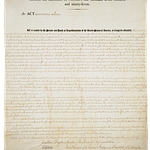This Day in Legal History: Supreme Court Limits Chinese Exclusion Act
On March 28, 1898, the United States Supreme Court made a groundbreaking decision in the case of United States v. Wong Kim Ark, fundamentally altering the landscape of immigration and citizenship law in America. The Court ruled that Wong Kim Ark, a child born in the U.S. to Chinese immigrants, was indeed a U.S. citizen by virtue of the 14th Amendment, which grants citizenship to all persons born or naturalized in the United States. This ruling came during a time when anti-Chinese sentiment was high, and the Chinese Exclusion Act of 1882 was in full force, prohibiting the immigration of Chinese laborers.
The case highlighted the tension between immigration policies based on racial exclusions and the constitutional principle of jus soli (right of the soil), which guarantees citizenship to almost all individuals born on U.S. soil. By affirming Wong Kim Ark's citizenship, the Supreme Court set a precedent that citizenship by birthright was not to be abridged based on race, ethnicity, or the national origins of one's parents. This decision was a critical counter to the prevailing policies of the time, which sought to limit the rights and freedoms of Chinese immigrants and their descendants.
The ruling also underscored the importance of the 14th Amendment in expanding civil rights, demonstrating its role not just in the context of African American rights post-Civil War, but also in protecting the rights of other minorities. United States v. Wong Kim Ark remains a cornerstone of constitutional jurisprudence, reinforcing the principle that the Constitution protects all individuals born on U.S. soil, regardless of their ancestry. This case is often cited in contemporary discussions on citizenship, immigration, and the rights of individuals under the U.S. Constitution, showcasing its lasting impact on American legal history.
On March 27, 2024, a California state judge recommended that John Eastman, former personal lawyer to Donald Trump and his co-defendant in a Georgia criminal case, be disbarred for his attempts to overturn the 2020 U.S. presidential election results. Judge Yvette Roland cited violations of California attorney ethics rules, emphasizing Eastman's deceit in his campaign against Joe Biden's victory, and described his actions as lacking in legal and factual foundation. The California Supreme Court will ultimately decide Eastman's professional fate, with his lawyer defending his actions as based on legal precedents and scholarly research.
Eastman, also facing charges in Georgia for efforts to challenge the election outcome, had advocated for then-Vice President Mike Pence to reject electoral votes during the Congressional certification process. Despite these efforts, Pence denied having the constitutional authority to do so. Furthermore, Eastman represented Trump in an unsuccessful Supreme Court challenge to the election results and participated in a rally that preceded the Capitol riot on January 6, 2021.
The case against Eastman is part of broader legal and ethics investigations into several attorneys associated with Trump's legal team's 2020 election challenges, including Rudy Giuliani and Jeffrey Clark, both of whom are facing their own set of legal and disciplinary challenges. These cases underscore the ongoing legal repercussions for individuals involved in disputing the 2020 election results.
Ex-Trump lawyer Eastman should be disbarred, California judge rules | Reuters
Law firm lateral hiring experienced a significant decline last year, falling 35% across all lawyer ranks, with associate hires dropping by 43% and partner moves by 10%, as reported by the National Association for Law Placement (NALP). This downturn, marking the second consecutive year of reduced law firm recruitment, reflects a deceleration in demand from corporate clients, leading to layoffs and decreased recruiting targets among major law firms. The pandemic-era surge in demand has tapered off, prompting firms to reassess their hiring strategies, especially in building associate ranks. Legal recruiters attribute much of the hiring decline to a slowdown in corporate practices, despite a slight increase in litigation roles.
The industry's response to reduced workloads has been cautious, influenced by previous cycles of rapid hiring followed by stagnation. Although partner hiring was less affected due to their ability to bring portable business, associate hiring aligns more closely with overall demand fluctuations. Recent months have seen a modest uptick in hiring activity, particularly in finance-related roles, suggesting firms are preparing for a gradual increase in lateral hiring. However, firms have also scaled back on the sizes of their summer classes, indicating a conservative outlook for the coming years. This cautious approach is driven by the anticipation of a continued lull in demand, with expectations of further layoffs and quick decisions on terminations for any performance issues.
Law Firm Hiring Plummets 35% Amid Layoffs, Slow Demand (2)
Chemours Co., a Delaware-based chemical company that was spun-off DuPont in 2015, is currently under investigation by the US Securities and Exchange Commission (SEC) and the Department of Justice (DOJ) due to concerns regarding its accounting practices. This probe was initiated after Chemours took the drastic step of placing its CEO, chief financial officer, and controller on leave following an internal review into the company's financial reporting and management practices. The internal investigation, triggered by an anonymous tip to the company's ethics hotline, specifically examined how the company managed its working capital and the potential impact on incentive plans, as well as certain practices not aligning with US generally accepted accounting principles (GAAP).
In early March, Chemours disclosed findings that indicated senior executives had manipulated the company's free cash flow figures in the fourth quarter of 2023. This manipulation involved delaying payments to vendors and accelerating the collection of receivables, actions that artificially enhanced the metrics used to calculate their bonuses. This serious revelation came as part of an ongoing effort by Chemours to address and rectify the identified accounting issues, with the company openly cooperating with the SEC and the DOJ's requests for information related to the Audit Committee's Internal Review and subsequent SEC filings. The situation marks a significant corporate governance and accountability challenge for Chemours, spotlighting the importance of ethical financial management practices.
Chemours Faces DOJ, SEC Accounting Probe Amid Shakeup at Top (1)
Following the collapse of Baltimore’s Francis Scott Key Bridge due to a collision with the container ship Dali, the ship's owner, operator, and charterer are anticipated to face lawsuits for the resulting deaths and injuries. However, legal experts point out that U.S. maritime law may significantly limit the liability of the involved companies, including Grace Ocean Pte Ltd, Synergy Marine Group, and Maersk. U.S. legal principles, stemming from a 1927 Supreme Court ruling, generally preclude recovery of purely economic damages from maritime incidents, meaning the city of Baltimore and affected businesses cannot recover losses related to the port closure or bridge damage through litigation against the ship’s owners and operators.
Claims are likely to focus on personal injuries, deaths, and physical damage or loss, with potential lawsuits expected to be filed in federal court. Victims might seek to "arrest" the ship to keep it within jurisdiction during litigation. Economic losses might instead be covered by insurance, with analysts predicting claims could reach up to $4 billion, potentially setting a record for shipping insurance losses.
The tragedy's limited human toll, attributed to the halting of traffic before the collapse, contrasts with the significant legal and financial aftermath. Maritime law allows for suing the ship itself and limits owner liability to the ship's value unless proven at fault, raising questions about the Dali’s condition and previous inspections. Unlike state laws, maritime law does not cap non-economic damages in wrongful death cases, offering a unique legal pathway for the victims' families.
Lawsuits over Baltimore bridge collapse likely, though limited, lawyers say | Reuters















Share this post